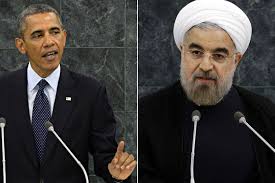Obama’s nuke deal with iran will upset isreal
Wednesday, November 27th, 2013 3:53:01 by Yamin Malik
Obama stands alone in defending the agreement with Iran
The White House is facing possible sanctions approval in Congress and a revolt of their allies in the Middle East.
Barack Obama faces the most important foreign policy challenge of his presidency , reconciliation with Iran, in absolute solitude , without clear support either within or outside the United States , forced to prove quickly that there are verifiable guarantees to keep the nuclear program in Iran under control and that there may be a shift in the opinions of major U.S. allies in the Middle East.
Obama’s position after the signing of the interim agreement is far more uncomfortable than their European colleagues in Geneva . U.S. President not only faces stiff opposition from both parties, including his own, at home, but threatened the traditional architecture of U.S. influence in the region. Israel and Saudi Arabia, the two pillars on which has settled the U.S. strategy, are against the pact with Iran and rethinking its relations with Washington.
In reality, both hotbeds of opposition are linked. The rejection of the agreement in Congress is, in part, a reflection of the complaints of Saudi Arabia and especially Israel. At the same time , both countries are determined to stand up to Obama because they know they have powerful friends on Capital Hill.
Although the agreement signed in Geneva opens a period of six months to consolidate the still tentative agreements, Obama does not have as long to overcome the resistance detected in the Senate term. Several senators, both Democrats and Republicans, have expressed their intention to discuss a new package of sanctions against Iran early next month, when the current Thanksgiving break ends.
Strong sanctions were not the good hearts of Iranian leaders , prompting Iran to the negotiating table , “recalled Schumer One of those who has spoken in favor of this option is considered one of the usual Obama allies in other aspects of their agenda, Sen. Charles Schumer , who has complained that the Geneva agreement ” lacks the required proportionality ” and therefore , ” increases the chances that Democrats and Republicans act together to approve new sanctions in December. “It was the heavy penalties , not the good hearts of Iranian leaders , prompting Iran to the negotiating table ,” recalled Schumer.
On behalf of the Republican opposition to the pact with Iran was already guaranteed before login. Senator Mark Kirk , who heads his party ‘s policy on the subject, said that the Islamic regime has made only “cosmetic concessions” and can not accept anything other than the “big freeze nuclear program.” Senator John McCain has called the foreign policy of this administration as the worst he has known in his life.
If the opposition Congress succeeds in the adoption of new sanctions against Iran in the coming days, Obama could be forced to veto to prevent derailing the whole process. One of the instruments of the White House to avoid getting to that point is to try to appease the wrath of Israel, which has already begun to with a phone call from Obama to Israeli Prime Minister Benjamin Netanyahu.
The main argument of the Administration is that , long term , Israel’s security will be best assured by a verifiable agreement that would prevent the construction of nuclear weapons in Iran instead of a military strike that could spark retaliation against Israel.
Besides the benefits to security in the Middle East, the U.S. is hoping in the event that this agreement flourish, an option to reshape the region, as claimed before the war in Iraq, but from a position much more realistic and viable. Apart of the alliance with Israel, which is irreversible and is based on principles that go beyond national interests, the U.S. has long been sensing a weakening of its position in the Middle East. Dependence of Saudi Arabia has worsened in recent years, while other important allies, such as Egypt , lost relevance because of their internal revolts.
The need for a realignment of the U.S. position seems obvious, with or without agreement with Iran. The agreement reached in Geneva might address such adjustment in collaboration with Tehran. The possibility should be attractive enough so that Obama could still find allies along the way.
Short URL: https://www.newspakistan.pk/?p=42222

















